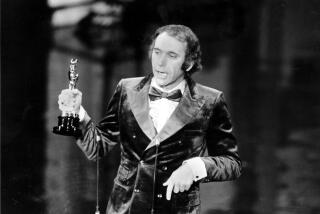Werner Klemperer; Played Col. Klink in ‘Hogan’s Heroes’
- Share via
Werner Klemperer, the character actor whose greatest success came in the role of Col. Klink, the German prison camp commandant of TV’s “Hogan’s Heroes,” died Wednesday at his New York home after a six-month battle with cancer. He was 80.
Klemperer won two Emmys for his portrayal of the inept but perversely likable Nazi in the show that was a first for television: a sitcom set in a German prisoner of war camp. The CBS series ran for six seasons, beginning in 1965. It still appears in reruns around the world, including Germany where it is a cult hit.
The actor was the son of former Los Angeles Philharmonic conductor Otto Klemperer, who fled Adolf Hitler’s Germany with his family in the mid-1930s and settled in California. The younger Klemperer never was bothered by the irony of a Jew playing a Nazi soldier, describing his portrayal of Klink as “just another acting assignment,” albeit one that made him famous to generations of TV fans.
He did not see the monocled Klink as just a Nazi. “Klink was an accommodator, a total bureaucrat,” Klemperer once told the Chicago Tribune. “He would have been the same if he had worked for General Motors.”
Although the bumbling Klink was his most identifiable role, Klemperer had a varied career on stage, including a featured role as Jewish shopkeeper Herr Schultz in the 1987 Broadway revival of “Cabaret” for which he received a Tony nomination.
After the prime-time run of “Hogan’s Heroes” ended in 1971, he began a second career as an orchestral narrator, working with all of the leading American orchestras on works ranging from “Peter and the Wolf” to Igor Stravinksy’s “Oedipus Rex.”
After graduating from high school, Klemperer studied at the Pasadena Playhouse, where his first professional acting job was in a production of “The Trojan Horse.”
He was mustered into the U.S. Army in 1942 and was assigned as a military policeman in the 33rd Infantry.
Later, he was transferred to a special service unit in Hawaii headed by Shakespearean actor Maurice Evans. He went on to tour Pacific combat areas for two years, performing in and directing such plays as “Macbeth” and “Arsenic and Old Lace.”
After the war, he took to acting in earnest, working on stage and in film. He made his Broadway debut in the 1947 production of “Heads or Tails.” In 1955 he was featured with Tallulah Bankhead in “Dear Charles,” also on Broadway.
He toured with the latter production until it reached Los Angeles, where he began to find work appearing in movies, including “Istanbul,” “Houseboat,” “The Goddess” and “Ship of Fools.” He also portrayed Adolf Eichmann in the 1961 film “Operation Eichmann.”
When the part of Klink was offered to him, Klemperer at first was reluctant to accept. A comedy about one of the ghastliest interludes in history seemed to stretch the bounds of good taste.
Gene Reynolds, who directed 36 episodes of the program and knew Klemperer for nearly 40 years, recalled Thursday how the Jewish actors on the program dealt with the issue.
“Some people did bring up the fact that--was it insensitivity on his part that he would be involved in a comedy of this sort,” Reynolds said. “This also applied to Robert Clary who played Cpl. Louis LeBeau. He was actually in Auschwitz. And John Banner, who played Sgt. Schultz, was a Viennese Jew.
“But the business of ‘Hogan’s’ did not offend them because they were not making fun of a concentration camp,” Reynolds added. “They were making fun of a prisoner of war camp and there is an enormous difference.”
Clary agreed with Reynolds’ assessment.
“First of all, ‘Hogan’s Heroes’ had nothing to do with concentration camps,” he said Thursday. “I am not diminishing what the prisoners of war went through, but there was no genocide for them and their families.”
Klemperer was also concerned about the notion of a funny Nazi.
He “was worried that the commandant would come out as a winner,” said Bernie Ilson, the actor’s longtime publicist. “He insisted in all the shows that he come out as the loser. He was sensitive about that.”
Klemperer credited his early musical training for his success as a comedic actor. As a boy, he studied piano, harmony and theory. As an adult, he saw parallels between comedy timing and rhythmic patterns in music.
“Music influences every move I make, and always has,” he told The Times in 1972. “It is a very personal thing for me, and it may be of little use to other actors.
“But I have often called upon Stravinsky, upon Strauss and Prokofiev for guidance in timing and rhythmic propulsion and nuance. I probably could not have gotten through those six ‘Hogan’ years, those 175 television installments, without this special technical crutch.”
In his later years, he performed eight to 10 times a year as a narrator for operas and orchestral productions. A Boston Symphony recording of Schoenberg’s “Gurrelieder” using his narration won a Grammy Award. Another consuming interest was the encouragement of young musical talent. He was for many years director and former president of the nonprofit Young Musicians Foundation of Los Angeles, which supports exceptional young musicians. He also was a vice president of Actors Equity.
Klemperer, who maintained homes in Los Angeles and New York, is survived by his wife, Kim Hamilton Klemperer; a daughter, Dr. Erika Klemperer Webster, of San Francisco; a son, Mark, of New York; and a sister, Lotte Klemperer, of Zurich, Switzerland.
Times staff writer Susan King contributed to this story.
More to Read
The complete guide to home viewing
Get Screen Gab for everything about the TV shows and streaming movies everyone’s talking about.
You may occasionally receive promotional content from the Los Angeles Times.







